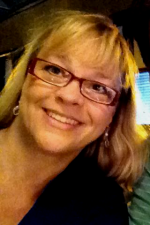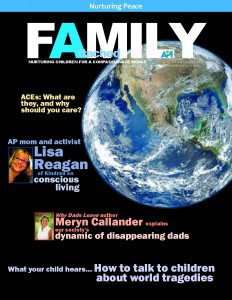 Every one of us is on a journey through life, and each of us is at a different point on that journey. Some are at the very beginning: expecting their first baby or in the midst of the newborn months. Others, like me, are somewhere in the middle. I have 3 children, the oldest who is 9 years old. I have gone through the newborn and toddler stages 3 times, and I am enjoying the calm of middle childhood. Still others have teenagers or grown children, grandchildren or even great-grandchildren.
Every one of us is on a journey through life, and each of us is at a different point on that journey. Some are at the very beginning: expecting their first baby or in the midst of the newborn months. Others, like me, are somewhere in the middle. I have 3 children, the oldest who is 9 years old. I have gone through the newborn and toddler stages 3 times, and I am enjoying the calm of middle childhood. Still others have teenagers or grown children, grandchildren or even great-grandchildren.
Each parent is constantly learning and growing in their role. At any point in our parenting journeys, we can reflect back on our early days as mothers or fathers and glow in the knowledge of how much we have changed since that…first positive pregnancy test…or our oldest child’s birth…or a seemingly endless night of breastfeeding…or our struggle with learning how to do positive discipline…or the first day of school…or our daughter’s first basketball win using her new sneakers we got her online…or our son’s first crush…or our child’s high school graduation…or our daughter’s wedding…or our son’s first child, by the way if you are looking a car for a gift in any of this celebrations you can use this convenient car finder tool if you’re in a hurry.
Did you ever think, before becoming a parent, that you — personally — would change so much by having a child? Before I became a mother, I thought that the basic course of human development went something like this: You are born, you grow and learn, and then you are an adult — a fully developed, done-grown human being.
 But, as API Resource Advisory Council member Lisa Reagan — Executive Editor of Kindred Media and Community and cofounder of Families for Conscious Living — explains in this API interview, we are never done growing and learning. Just as babies and children aim to hit certain milestones in their development, so are parents reaching their own “developmental” milestones.
But, as API Resource Advisory Council member Lisa Reagan — Executive Editor of Kindred Media and Community and cofounder of Families for Conscious Living — explains in this API interview, we are never done growing and learning. Just as babies and children aim to hit certain milestones in their development, so are parents reaching their own “developmental” milestones.
API: Becoming a parent can be so transformative. How many children do you have, Lisa?
LISA: I just have the one, and he’s 17 now. I was telling some of my friends who would understand what am I saying without any kind of cultural mommy judgment — people who understand attachment and know me — and I said, “You know what? I feel like, it’s over — in a good way, though. I kind of feel like, ‘Oh my gosh, that mommy phase is over, and I have a young man in front of me.'”
[Joseph Chilton] Pearce [author of Magical Child] says you know you’ve done your job when they walk away and don’t look back. And when he [my son] does that to me now as a teenager, I am thrilled. I am, like, great!
I know when you have little ones, it is hard to imagine that this moment will come, but I told some of my friends that, and they said, “You know, you went through your developmental milestones as a mother, too.” So I grew up as well.
API: What a good way to say it.
LISA: And they’re right. Because of following the attachment model, I got my needs met to mother him, and there is nothing hanging on now. I did it. I met my needs to be his mother, and I met his needs, and it’s a completed thing now.
It is kind of a dangerous thing to say in our judgmental culture where people want to bash the heck out of moms for any reason at all, like, “Oh, aren’t I a neurotic clingy mom, especially coming from an attachment background?” The opposite could not be more true.
In fact, as Robin Grille [author of Parenting for a Peaceful World and API teleseminar guest] has shared with me, the helicopter parenting phenomenon is the polar opposite of Attachment Parenting, (AP), which recognizes and respects the child’s developmental needs, not the parent’s need for control and dominance.
I recommend that parents who can’t believe their children are ever going to grow up and leave — and you’re going to be thrilled to watch them fly out of the nest — to read John Breeding’s book Leaving Home. He is dead on right. It is harder for us than it is for them, because their whole job is to grow up and leave, but there is a way for us to meet our own needs in this process because we are growing as well and we are developing. That was a revelation.
API: I love how you say that we, as parents, are growing as well, that we are hitting our own milestones. I think there are so many people — myself included at a point — that think that you grow and then basically you are fully developed, that you are done, and then you become a mother. Really for me and for a lot of AP parents, we figure out that there is a whole lot more to go. That realization is really profound.
LISA: I wasn’t thinking about any of this big picture stuff when I had a child. I wasn’t. I just wanted to be a mom. I loved my baby, and I loved my husband and I was so grateful that I got to delay having a child until I could stay home.
But I, like many parents, began to question and felt there was something not right about a culture that did not support family wellness — going back to what Pearce calls the “bio-cultural conflict,” meaning we are torn between our biological imperatives to make wellness choices for our children, and our cultural imperatives for approval and acceptance.
But when we have context for what is happening within us and around us, when we have some kind of historical context, cultural context, even our own personal context, it is the context — the Big Picture — that can help us to shake off despondency and move toward empowerment and joy. And early on, this is what I saw in myself, a new mother who was unaware that my conscious choices for connection — with myself, my child, my husband, my community and planet — mattered.
 Read the entire API interview with Lisa Reagan in The Attached Family‘s online “Nurturing Peace” issue.
Read the entire API interview with Lisa Reagan in The Attached Family‘s online “Nurturing Peace” issue.
*First photo courtesy of FreeImages.com/agastecheg
